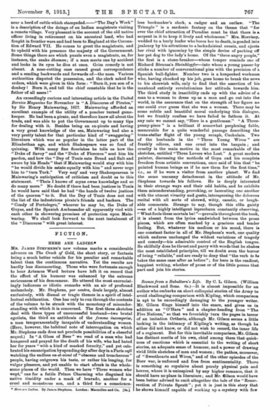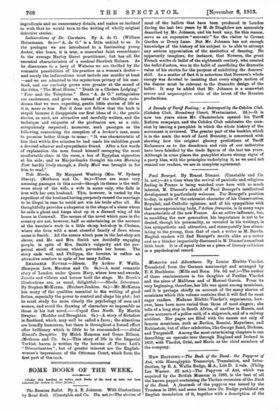HERE ARE LADIES.*
MR. JAMES STEPHENS'S new volume marks a considerable advance on The Crock of Gold, the short story, or fantasia being a much better vehicle for his peculiar and remarkable talent than the continuous narrative. Yet the results are hardly less disconcerting. Those who were fortunate enough to hear Artemus Ward lecture have left it on record that the effect of his humour was enhanced by the extreme seriousness of his demeanour. He uttered the most excruciatingly ludicrous or idiotic remarks with an air of profound melancholy. Mr. Stephens, per contra, deals largely, almost exclusively, with dismal or tragic themes in a spirit of intellectual exhilaration. One has only to run through the contents of the volume to be struck with the monotony of misunderstanding with which it is concerned. The first three sketches deal with three types of unsuccessful husband—two brutal egotists, the third an antithesis of the femme incomprise, a man temperamentally incapable of understanding women. (Here, however, the habitual note of interrogation on which Mr. Stephens ends does not preclude possibilities of a cheerful sequel.) In "A Glass of Beer" we read of a man who had hungered and prayed for the death of his wife, who had hated her for years "with a kind of masked ferocity," and yet celebrated his emancipation by spending day after day in aParis cafe watching the endless va-et-vient of "obscene and treacherous" people, having outgrown his taste, or rather his longing, for vulgar pleasure, and yet unable to start afresh in the wholesome places of the world. Then we have "Three women who wept," one for a futile Prince Charming who disguised his native timidity under a mask of bravado, another for a cruel and monstrous son, and a third for a conscience
less bookmaker's clerk, a cadger and an outlaw. "The Triangle" is a sardonic fantasy on the theme that "for ever the chief attraction of Paradise must be that there is a serpent in it to keep it lively and wholesome." Mrs. Morrissy, wedded to a burly loafer who bores her to death, is goaded into jealousy by his attentions to a lackadaisical cousin, and ejects her rival with ignominy by the simple device of packing off her pet dog to the lady's home. Of the "three angry people," the first is a stone-breaker—whose temper reminds one of Richard Strauss's Steinhlopfer—into whom a young passer-by sticks a number of conversational pins with the precision of a Spanish bull-fighter. Number two is a henpecked workman who, having chucked up his job, goes home to break the news to his shrewish wife, only to find that the assertion of his manhood entirely revolutionizes her attitude towards hint. The third study in irascibility ends up with the advice of a man to a woman to dress up as a man and go out into the world, in the assurance that on the strength of her figure no one could ever guess that she was a woman. There may be some subtle and beautiful moral underlying this dialogue, but we frankly confess we have failed to fathom it. At any rate we cannot say, "Here is a gentleman." "A Threepenny-piece " is a brilliant if somewhat perplexing fable, memorable for a quite wonderful passage describing the trans-stellar flight of the young seraph, Cuchulain. Two of the husbands in the " Three Young Wives " are frankly odious, and one cruel into the bargain ; and cruelty is the main motive in the most remarkable of the sketches, entitled "Three Lovers who Lost." A great modern painter, discussing the methods of Goya and his complete freedom from artistic conventions, once said of him that "be painted human beings as if be saw them for the first time," i.e., as if be were a visitor from another planet. We find the same uncanny detachment in the attitude of Mr. S:ephens towards his fellows. He is deeply interested in their strange ways and their odd habits, and he exhibits them misunderstanding, provoking, or lacerating one another with the utmost vivacity and gusto, interspersing the dolorous recital with all sorts of shrewd, witty, caustic, or laughable comments. Strange to say, though this elfin gaiety —as of a highly intelligent leprechaun constantly observing, "What fools these mortals be! "—prevails throughout the book, it is absent from the lyrics sandwiched between the prose pieces, which are often marked by a gracious and tender feeling. But, whatever his medium or his mood, there is one constant factor in all of Mr. Stephens's work, one quality which endures unchanged the wildest variations of tragedy and comedy—his admirable control of the English tongue. So skilfully does he thrust and parry with words that he shakes the most established principles, till we doubt even the horror of being "reliable," and are ready to deny that "the verb to be takes the same case after as before"; for here is the readiest, happiest writing, whether of prose or of the little poems that part and join his stories. Scenes from a Subaltern's Life. By C. L. Gilson. (William Blackwood and Sons. 6s.)—It is almost impossible for an author who embarks on short colloquial stories of the Army to avoid challenging comparison with Kipling, which comparison is apt to be exceedingly damaging to the younger writer. Mr. Gilson flings himself into the snare, and gives us in addition an " O'Hara " and a chapter-heading from "The Five Nations," so that we feverishly turn the pages in terror of an imitation Ortheris, although Mr. Gilson seems a little lacking in the intimacy of Kipling's writing, as though he either did not know, or did not wish to record, the inner life of a regiment. But for this inevitable comparison, Mr. Gilson has distinct merits of his own, chief among them that quickness of emotions which is essential to the writing of short stories, an adequate sense of humour, and a power of drawing vivid little sketches of men and women ; the pathos, moreover, of "Sweethearts and Wives," and of the other episodes of the Boer war, is unforced and free from sentimentality. There is something so repulsive about purely physical pain and horror, where it is uninspired by any higher romance, that it should have no place in literature ; and Mr. Gilson would have been better advised to omit altogether the tale of the "Remit-rection of Private Spratt " ; yet it is just in this story that he shows himself capable of working up a mystery with few
ingredients and no unnecessary details, and makes us inclined to wish that he would turn to the writing of wholly original detective stories. Indiscretioms of Dr. Carstairs. By A. de 0. (William Heinemann. 6s.)—" A. de 0." is a little unkind to us. In the prologue we are introduced to a fascinating young doctor, who bears, it is true, a somewhat faint resemblance to the average Harley Street practitioner, but has all the essential characteristics of a medical Sherlock Holmes. As be discourses to a bevy of Watsons we are thrilled by the romantic possibilities of his practice as a woman's doctor— and surely the indiscretions must include one murder at least —and we are admitted to the mysterious privacy of his casebook, and our curiosity grows ever greater at the sound of the titles, "The Moat House," "Death in a Chelsea Lodging," "Fate and the Telephone." Here "A. de 0." extinguishes our excitement, and gives us, instead of the thrilling melo drama that we were expecting, gentle little stories of life as it is, more or less. But it does not follow that the book is stupid because it disappoints our first ideas of it; the gentle stories, as such, are attractive and carefully written, and the technique and etiquette of the profession are, as a rule, scrupulously respected; moreover, such passages as the following, concerning the reception of a broker's man, seem to promise better things to come : "It was characteristic of him that within five minutes he had made his unbidden guest a devoted admirer and sympathetic friend. After a few words of explanation the man found himself occupying the most comfortable chair in the room, a box of Egyptian cigarettes
at his side; and as Marjoribanks thought his own Morning Post hardly lively enough, a Daily Hail was brought in for him to read." Tide Marks. By Margaret Westrup (Mrs. W. Sydney Stacey). (Methuen and Co. 6s.)—There are some very amusing passages in this novel—though its theme is the well worn story of the wife, a wife in name only, who falls in love with her own husband. This, however, is varied by the expedient of the husband having purposely caused the marriage to be illegal in case he could not win his bride after all. He thoughtfully provides a chaperon in the share of a sister whom be calls a ghost and keeps shut up in a disused wing of his house in Cornwall. The scenes of the novel which pass in the country are not, however, half so entertaining as the account of the heroine's work in a little cheap hat-shop in Chelsea, where she lives with a most cheerful family of Jews whose name is Smith. All the scenes which pass in the bat-shop are
clever, and Mr. and Mrs. Smith are decidedly engaging people, in spite of Mrs. Smith's vulgarity and the perpetual smell of onions which pervades her house. The story ends well, and Philippa, the heroine, is rather an attractive creature in spite of her many follies. READABLE NOVELS.—/dOnia. By Arthur F. Wallis. (Sampson Low, Marston and Co. Gs.)—A most romantic story of London under Queen Mary, where love and swords,
Jesuits and villains and heroes hold the stage. Mr. Brock's illustrations are, as usual, delightful.—Sheila Intervenes. By Stephen McKenna. (Herbert Jenkins. Gs.) —Mr. MoKenna has many of the qualities essential to he writing of good fiction, especially the power to control and shape his plot; but he must study far more closely the psychology of men and women, and avoid the drawing of characters so impossible as those in his last novel.—Cupid Goes North. By Martin Swayne. (Hodder and Stoughton. Gs.)—A story of flirtation in Scotland, which may well be called a farce; the situations are broadly humorous, but there is throughout a forced effort
after brilliancy which is little to be commended.—Abdul Hamid's Daughter. By Melek Hanoum and Grace Ellison. (Methuen and Co. Gs.)—This story of life in the Imperial Turkish harem is written by the heroine of Pierre Loti's " Desenchant6es " ; but of greater interest are the Englishwoman's impressions of the Ottoman Court, which form the first part of the, book.



















































 Previous page
Previous page